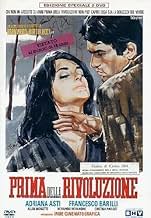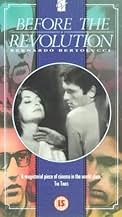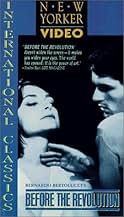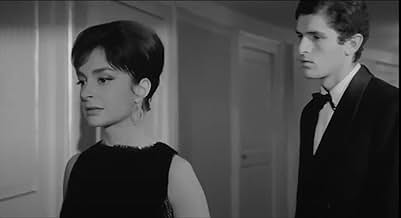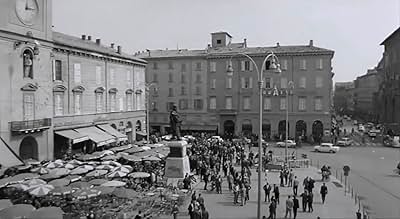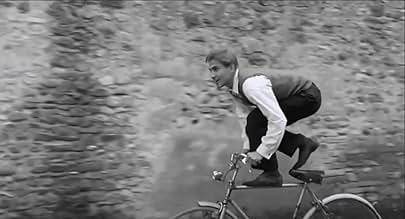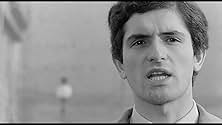IMDb RATING
6.8/10
3.4K
YOUR RATING
Following the death of his friend, an Italian youth grows increasingly closer to his young aunt.Following the death of his friend, an Italian youth grows increasingly closer to his young aunt.Following the death of his friend, an Italian youth grows increasingly closer to his young aunt.
- Director
- Writers
- Stars
- Awards
- 2 nominations total
- Director
- Writers
- All cast & crew
- Production, box office & more at IMDbPro
6.83.3K
1
2
3
4
5
6
7
8
9
10
Featured reviews
Just like a French New Wave film
For a while, forget about Bernardo Bertolucci's "ventures into Hollywood" (for example, "Little Buddha," featuring Keannu Reeves) and find time to see his "little-known" work, "Before the Revolution" (his second feature film, which was made in his native country and when he was just 22 years old).
More than a "nostalgic" tribute to the "present," the film is closer in spirit and style to the French New Wave films (see, for example, Jean-Luc Godard's "A Bout de Souffle" and Francois Truffaut's "Jules et Jim";as a matter of fact, Bertolucci's film was contemporaneous with these works).
In the film, you'll find a bedazzling mixture of narrative styles (those relating to camera movements and angles, editing, photographic effects and musical score;my favorites are the "optical room" scene and the old man painting by the lakeside), characters who are always "running away" from something (from social conventions and pressures, from others as well as from themselves) and for whom to live is to discourse (with other people or with themselves), and a "romantic" and "apolitical" stance toward a relevant sociopolitical issue ( in this case, the workers' uprising and the Revolution of 1948).
Initially slow and hard to get by, but the film eventually engages the viewers' attention as "love" starts to develop between the aunt (Gina) and the nephew (Fabrizio), which other people may find "scandalous," but is treated in such a casual and indifferent manner that the result is "unaffecting" (much like the way the menage-a-trois was treated in "Jules et Jim"), and as one gets to know more (or does one?) the quirky and enigmatic characters.
More than a "nostalgic" tribute to the "present," the film is closer in spirit and style to the French New Wave films (see, for example, Jean-Luc Godard's "A Bout de Souffle" and Francois Truffaut's "Jules et Jim";as a matter of fact, Bertolucci's film was contemporaneous with these works).
In the film, you'll find a bedazzling mixture of narrative styles (those relating to camera movements and angles, editing, photographic effects and musical score;my favorites are the "optical room" scene and the old man painting by the lakeside), characters who are always "running away" from something (from social conventions and pressures, from others as well as from themselves) and for whom to live is to discourse (with other people or with themselves), and a "romantic" and "apolitical" stance toward a relevant sociopolitical issue ( in this case, the workers' uprising and the Revolution of 1948).
Initially slow and hard to get by, but the film eventually engages the viewers' attention as "love" starts to develop between the aunt (Gina) and the nephew (Fabrizio), which other people may find "scandalous," but is treated in such a casual and indifferent manner that the result is "unaffecting" (much like the way the menage-a-trois was treated in "Jules et Jim"), and as one gets to know more (or does one?) the quirky and enigmatic characters.
Very early flawed but interesting work by Bertolucci
While hailed as many as a masterpiece (or near), I struggled with Bertolucci's 2nd film, made when he was only 23, although I am a fan of his in general. Beautifully shot, great use of music and unconventional editing, the film is excellent on a film-making and craft level (although it perhaps borrows too liberally from leading film-makers of the era, especially Godard, Antonioni and Resnais).
The story of a young bourgeois man trying to come to terms with his tear between his attraction to communism and his desire for an easier life leads him into an incestuous affair with his somewhat older aunt. I found it's themes somewhat muddled, alternating between being heavy-handedly spelled out, or so obtuse I wasn't sure what a given scene was saying.
The acting in particular seems a bit all over the place; understated to the point of flatness in one scene, and then almost theatrically over the top the next. At the end I felt glad I'd seen the film, but it didn't stick with me the way Bertolucci's first film "La Commare Secca" or his third "Partner" did. ("Partner" deals with some of the same themes, but in a far more playful, often comedic way). There was a film-school sort of pretentiousness and emotional distance in "Before the Revolution that kept me from feeling moved or from being led to think deeply about the ideas.
That said, I am willing to revisit it and see if my reaction changes, and certainly I enjoyed Bertolucci's already masterful use of image and sound, even if the ends he was using them to were a bit muddled.
The story of a young bourgeois man trying to come to terms with his tear between his attraction to communism and his desire for an easier life leads him into an incestuous affair with his somewhat older aunt. I found it's themes somewhat muddled, alternating between being heavy-handedly spelled out, or so obtuse I wasn't sure what a given scene was saying.
The acting in particular seems a bit all over the place; understated to the point of flatness in one scene, and then almost theatrically over the top the next. At the end I felt glad I'd seen the film, but it didn't stick with me the way Bertolucci's first film "La Commare Secca" or his third "Partner" did. ("Partner" deals with some of the same themes, but in a far more playful, often comedic way). There was a film-school sort of pretentiousness and emotional distance in "Before the Revolution that kept me from feeling moved or from being led to think deeply about the ideas.
That said, I am willing to revisit it and see if my reaction changes, and certainly I enjoyed Bertolucci's already masterful use of image and sound, even if the ends he was using them to were a bit muddled.
A delicious French food in Italian style.
BEFORE THE REVOLUTION is a romantic drama film about the maturation of a rebellious young man who, because of his bourgeois origin, lives an easy life. This is the story of torn characters and revolutionary ideals. It is very cold review of the generation gap in Italy.
Fabrizio, a young student in Parma, examines the relations between the middle class and the Communist Party in Italy. He is traumatized by the death of his friend, who has drowned in the River Po. To make matters worse, his beautiful and ten years older aunt Gina from Milan becomes part of his love life. Fabrizio is torn between his weaknesses, aspirations, ambitions and loving care, but a life decision must be made...
Mr. Bertolucci has put a young and beautiful woman at the center of a chaotic love story, which swirls around an immature young man. That young man constantly searches his place in modern civilization flows, and rebels against everything. He comes into contact with an abstract philosophy, art and passionate love. On the other side is an unfortunate young woman, who further complicates the life of an adolescent. She only seeks his understanding and love.
The collapse of a revolution is reflected through the inability of giving and receiving love. A period of a vulnerability, emotional meltdown and alienation comes after that.
An authentic scenery and soundtrack harmoniously fit into this uncertain story.
Francesco Barilli as Fabrizio has offered a good performance of a torn young man who constantly taps in place. Adriana Asti in role of his aunt Gina has picked up my sympathies as a beautiful and unhappy young woman who plays love games with her nephew.
A delicious French food in Italian style.
Fabrizio, a young student in Parma, examines the relations between the middle class and the Communist Party in Italy. He is traumatized by the death of his friend, who has drowned in the River Po. To make matters worse, his beautiful and ten years older aunt Gina from Milan becomes part of his love life. Fabrizio is torn between his weaknesses, aspirations, ambitions and loving care, but a life decision must be made...
Mr. Bertolucci has put a young and beautiful woman at the center of a chaotic love story, which swirls around an immature young man. That young man constantly searches his place in modern civilization flows, and rebels against everything. He comes into contact with an abstract philosophy, art and passionate love. On the other side is an unfortunate young woman, who further complicates the life of an adolescent. She only seeks his understanding and love.
The collapse of a revolution is reflected through the inability of giving and receiving love. A period of a vulnerability, emotional meltdown and alienation comes after that.
An authentic scenery and soundtrack harmoniously fit into this uncertain story.
Francesco Barilli as Fabrizio has offered a good performance of a torn young man who constantly taps in place. Adriana Asti in role of his aunt Gina has picked up my sympathies as a beautiful and unhappy young woman who plays love games with her nephew.
A delicious French food in Italian style.
10zetes
One of the most stunning pieces of filmmaking I've ever seen
Before the Revolution, Bernardo Bertolucci's second film, is kind of a mess. He was only 22 when he made it, and he must have made it immediately after he finished his first film, Grim Reaper. It's obvious that he's a genius from this film. Like I said, it's kind of a mess, but no more beautiful mess has ever been created in the cinema.
The story is difficult to follow at times, but it is basically about a young bourgeois man who falls in love with his young aunt. Their relationship is socially unacceptable, so it immediately begins to break apart. As it does, politics rush into the film, confused politics, probably representing Bertolucci's own conflicting feelings at this point. The whole film feels very personal.
I don't know. I really didn't catch too much of, well, what's going on. Which sounds bad, but there's a good reason for my missing everything: Bertolucci's direction is breathtaking. It is a nice cross between French New Wave and the Modernist movement that the Italian filmmakers were going through at the time. Bertolucci throws every single cinematic trick into the film that he can fathom. Everything works, though. It's showy, to be sure, but it's never less than one of the most beautiful things I've ever experienced. It never seems less than amazing. The emotions of the film - and they really hit home, even if the story is difficult to follow - are fractured and manic.
I need to watch Before the Revolution again. I feel, though, that even if I find it completely flawed the second time around, it could be nothing less than the greatest flawed masterpiece ever produced. 10 years after Before the Revolution, Bernardo Bertolucci directed what I consider my third favorite film, Last Tango in Paris. By then, he had perfected his style. I'll be adding another Bertolucci film to my list of favorites tonight.
The story is difficult to follow at times, but it is basically about a young bourgeois man who falls in love with his young aunt. Their relationship is socially unacceptable, so it immediately begins to break apart. As it does, politics rush into the film, confused politics, probably representing Bertolucci's own conflicting feelings at this point. The whole film feels very personal.
I don't know. I really didn't catch too much of, well, what's going on. Which sounds bad, but there's a good reason for my missing everything: Bertolucci's direction is breathtaking. It is a nice cross between French New Wave and the Modernist movement that the Italian filmmakers were going through at the time. Bertolucci throws every single cinematic trick into the film that he can fathom. Everything works, though. It's showy, to be sure, but it's never less than one of the most beautiful things I've ever experienced. It never seems less than amazing. The emotions of the film - and they really hit home, even if the story is difficult to follow - are fractured and manic.
I need to watch Before the Revolution again. I feel, though, that even if I find it completely flawed the second time around, it could be nothing less than the greatest flawed masterpiece ever produced. 10 years after Before the Revolution, Bernardo Bertolucci directed what I consider my third favorite film, Last Tango in Paris. By then, he had perfected his style. I'll be adding another Bertolucci film to my list of favorites tonight.
it's a grower
It's strange to think that Bertolucci was only 23 when he did this film, but then it makes perfect sense cause the story loosely centers around a young man approaching adulthood. It's even stranger to realize that only 8 years later he directed 'The Last Tango in Paris' where his protagonist already experiences his midlife crises. Back in 1964 Bertolucci's main interest was not story telling but rather to find a new visual language to portray his generation. Heavily influenced by the Nouvelle Vague, Godard in particular, that he even mentions at some length here, Bertolucci is eager to break with as many (cinematographic) conventions as possible, but the imagery he develops in the process is so beautiful that this is a delight to watch from beginning to end. Also it serves as a reminder that there was actually a time when there seemed to be an alternative to capitalism, though the revolution is only talked about. The whole thing works like a kaleidoscope or mosaic of the time. At first I had trouble to follow the plot because scenes don't necessarily respond to each other in a cause and effect kinda way but once I realized that an ongoing story is not what this is about I was able to relax and enjoy the scenery even more. And though our heroes suffer from first signs of disillusion, back then everything seemed possible, whether it was changing our society or changing the aesthetics of cinema. What interesting times.
Did you know
- TriviaBernardo Bertolucci was only 22 when he made this film.
- ConnectionsFeatured in Nathalie... (2003)
- How long is Before the Revolution?Powered by Alexa
Details
Box office
- Gross worldwide
- $12,199
- Runtime
- 1h 45m(105 min)
- Color
- Sound mix
- Aspect ratio
- 1.85 : 1
Contribute to this page
Suggest an edit or add missing content

![Watch Trailer [OV]](https://m.media-amazon.com/images/M/MV5BNWRiN2E3YjYtNmI2MC00ZjdmLWE2N2EtYWFjYTNjZTRmZTZiXkEyXkFqcGdeQXRodW1ibmFpbC1pbml0aWFsaXplcg@@._V1_QL75_UX500_CR0)
